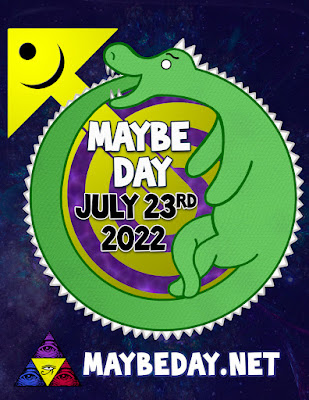Eric Wagner with jazz great Anthony Braxton in a Facebook photo posted last year.
[Eric Wagner is the author of An Insider's Guide to Robert Anton Wilson. He is a California schoolteacher and writer and often posts on Facebook. He is a serious jazz and classical music listener and apparently likes all other kinds of music, too. He has led Finnegans Wake study groups. For the new Hilaritas Press edition of Wilhelm Reich In Hell, he wrote a new introduction to supplement his previous introduction, and also wrote a piece when Rasa sent out the official announcement about the new edition.
Fortunately for this blog, Eric has not run out of things to say about Wilhelm Reich In Hell or about Robert Anton Wilson. He agreed to take my questions and here is my interview with him. Thanks to Mr. Wagner for his generous allocation of time and attention to my questions. The Management.]
RAWILLUMINATION.NET: There are still a few RAW books I have not read -- I read Wilhelm Reich in Hell for the first time last week -- but I'm guessing you've read all of his works. How do you think this newly-republished title fits into the RAW canon?
ERW: This play represents Bob’s look at how our society responds to scientists outside the norms of our scientific community. Dr. Leary and Dr. Reich seem prime examples of this. Also the questions of censorship seem important to Bob. The US government burned Dr. Reich’s books. In the 1980’s some feminists burned works they considered pornographic. When I visited the concentration camp at Dachau, I saw this Heinrich Heine quote on display, “First they burn books, then they burn people.”
RAWILLUMINATION.NET: The book is essentially in two parts -- an essay and a play. I thought the essay was RAW on the top of his game; I liked the play, but my feelings were a bit more mixed. How do you think the play works as a play? Have you seen it performed?
ERW: I love the play. I enjoyed the DVD of the play directed by Lance Bauscher. As I commented in one of my introductions, Bob ends his two screenplays with Beethoven’s “Ode to Joy”. This play doesn’t end that way. Bob had strong utopian notions, but he realized the darker possibilities. I find this play very funny, very disturbing, and very worthwhile.
RAWILLUMINATION.NET: You wrote a new introduction for the new edition. Did Rasa give you any direction on what he wanted? What were you trying to do with the new introduction?
ERW: No, Rasa just kindly asked me if I would like to do a new introduction. I find myself fascinated by Bob’s interest in the Decembrists in the last three years of his life. I had this in my mind as I reread the book in December of 2021. As I commented in my intro, the character of Dr. Reich seemed fundamentally sane to me as I read the play. Ironically, I had forgotten that at the end of the play Reich admits to his insanity.
Bob Wilson seems like one of the sanist people I have ever met. Reich in this play differs from Bob Wilson, particularly in his attitudes towards drugs. John Keats suggested that Shakespeare had the ability to negate his own personality in creating new characters, and Keats called this ability “negative capability”. Wilson’s portrayal of Reich in this play seems like a wonderful example of negative capability to me.
RAWILLUMINATION.NET: Do you think the book will work for RAW fans who aren't particularly interested in Wilhelm Reich?
ERW: Absolutely. This book seems like a meditation on the outsider, and Wilson shows how Reich’s case parallels those of Timothy Leary, Giordano Bruno, Ezra Pound, and others. It also deals with the theme of how we become what we pretend. Kurt Vonnegut did a terrific job with this theme in his novel Mother Night where an American pretended to support Naziism during World War II while acting as secret agent. However, he did such a good job pretending to support Naziism that he encouraged others to become Nazis. He wonders whether did more harm or good by his actions.
In the play the actor playing Reich enters an odd altered state of consciousness by entering into Reich’s headspace. The reader and/or viewer may enter odd altered states of consciousness while encountering and enduring the play.
RAWILLUMINATION.NET: Hilaritas Press is republishing 19 RAW titles and also brought out The Starseed Signals from an unpublished manuscript, with 16 books published so far. Do you have a favorite among the remaining titles? Do you have a favorite "unsung" RAW title?
ERW: Well, I love TSOG: The Thing That Ate the Constitution, especially the final section on The Tale of the Tribe. For years I felt disappointed that Bob never wrote The Tale of the Tribe, but now I simply treasure the fragment in TSOG. In The Romantic Generation Charles Rosen discussed the fragment as a Romantic form. I now see The Tale of the Tribe as an evanescent fragment, a pointer to other universes where it sits beside an unedited version of Orson Welles’ The Magnificent Ambersons, Joyce’s novels after Finnegans Wake and Proust’s final version of Time Regained. Plus I have become fascinated by Bob’s interest in the Decembrists, and this book provides a number of clues to Bob’s resistance to Tsarism in the United States.
I love the two screenplays, The Walls Came Tumbling Down and Reality Is What You Can Get Away With. I used to have a “Reality Is What You Can Get Away With” bumper sticker which I got from Bob’s newsletter Trajectories. These days so many streaming services search for content, so it would not surprise me if someone produces these two films sometime soon, perhaps in a language other than English.
Speaking of Trajectories, I love both of the Trajectories anthologies, Chaos and Beyond and Beyond Chaos and Beyond. I remember getting Chaos and Beyond in the mail just before I left for Egypt in 1994. In the introduction Bob talked about reading Korzybski’s Science and Sanity over and over again, so I went to the Arizona State University Library and checked out a copy and decided to finally read it cover to cover. I took that bulky book along with me to Egypt. I didn’t read much of it that as I visited the Stele of Revealing, King Tut’s tomb and the Abu Simbel Temples, etc., but I did eventually finish it.
In terms of “unsung” Wilson titles, I would like to see everything back in print. I particularly love the original three volume edition of Schrödinger’s Cat. They seem like great books to me. I love the condensed one volume edition, but I prefer the original version. I would like both versions to remain in print. I first bought volume one in May 1982, and I really liked it. I bought volume two the following month, and my life changed forever.
I love that you can read The Sex Magicians online, but I would love for it to come back in print. Numerous studies have shown that comprehension and recall improve when reading a book made of paper rather than one on a screen. Plus, I used to teach at a high school which forbade the use of books made of paper, allowing only electronic texts. That has made me love books made of paper even more.
I would also love to see Playboy’s Book of Forbidden Words come back into print. When I lived in Arizona, I read the copy the Scottsdale Public Library had in their reference section. One couldn’t check it out, so I read it during my lunch hour each day for a few weeks when I worked at a bookstore nearby. I know the editors changed Bob’s original text, but I would still like to see it in print.
I would like to see Right Where You Are Sitting Now come back into print. (From an E-Prime perspective I find it interesting that this book, Reality Is What You Can Get Away With, and Everything Is Under Control all have forms of the verb “to be” in their titles.) I think Michael Johnson read this book before he read any other Wilson book. I would love to see a new edition with an introduction by Michael Johnson. I remember novelist Paul Chuey and I went to see the Who in 1982, and we each brought a Robert Anton Wilson book to read. I think I brought Right Where You Are Sitting Now. If not, Paul brought it. We sat with our backs to the stage and read during the opening acts Loverboy and John Cougar Mellencamp. Ah youth. Someone through a bottle that hit John Cougar in the head during his set. I don’t remember if we saw the throw or not.
I used to love the Viking Portable Library paperbacks. Most bookstores used to have a number of them. I remember reading The Portable Nietzsche the week before I turned thirty. I owned two very different editions of The Portable Dante, and I used the newer edition for my high school Dante Society for more than a decade. I think a lot of Joyce scholars still use The Portable James Joyce, which contains the complete texts of Dubliners, A Portrait of the Artist as a Young Man, Chamber Music, Poems Penyeach, and Exiles, as a well as excerpts from Ulysses and Finnegans Wake.
In the 1980’s I used to fantasize that Viking would publish The Portable Robert Anton Wilson. I would wonder what such a volume should include. I had to keep the length under a thousand pages. I wanted to include a complete stand alone novel, so I thought Masks of the Illuminati would work well. I loved Natural Law, Or Don’t Put a Rubber on Your Willy, and its short length made it a good selection. Of course now Hilaritas Press has given us a longer book which includes the original essay with some other terrific selections. I also thought The Illuminati Papers would make a nice addition. (I liked that many of the Viking Portable books contained so many complete works.) I would also include one the essay “Brain Books”, and a few other essays. You can find “Brain Books” in Beyond Chaos and Beyond.
And, oh yes, I love The Illuminati Papers. I consider “Ten Reasons to Get Up in the Morning” one of my very favorite Wilson essays, and The Illuminati Papers also includes great essays on Finnegans Wake, Ezra Pound and Beethoven. Man, I pored over that book and all my Wilson books so much in the 1980’s. I treasured each bit of Bob’s writing back in those pre-internet days, following up leads. Of course, as with Science and Sanity, it took me a lot of tries to get into many of Bob’s favorite books. I would get books Bob had recommended from out of the library or as gifts, and I would give them a shot. If I couldn’t get into them, I would go back and reread a bit of Wilson, and then I would try another one of his recommendations.
I remember haunting the bookstores, checking various sections. I first found Bob’s books in the science fiction section: Schroedinger’s Cat, Illuminatus!, and Masks of the Illuminati. Then I found some in the New Age sections: The Illuminati Papers and Right Where You Are Sitting Now. In 1983 I found the new hardcover edition of The Earth Will Shake in the general fiction section. I don’t think I’ve seen a Wilson book in the general fiction section since then. Then I started visiting occult book stores, especially The Alpha Book Center in Phoenix. After I checked for a new Wilson book like Prometheus Rising, I would scour the shelves for the Falcon Press logo, buying most of their early titles. Later in the eighties Bob started having articles in magazines like Magical Blend and Gnosis. Books, Etc. in Tempe carried both of those magazines, so I would check the magazine racks each time I visited the store.
Occasionally I would order Wilson books like Natural Law, Or Never Put a Rubber on Your Willy by mail. Back then delivery would take weeks, if not months. Once my friends Steve and Vicky Snow got a copy of Cosmic Trigger II (I think – maybe Cosmic Trigger III, my memory fades) from Bob himself. I didn’t even know it had come out yet, so I ordered a copy. I remember feeling so jealous they got to read it first.



























.jpg)






